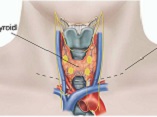Investigating the Effect of Topical Dexamethasone at the Site of Thyroid Surgery (on the Parathyroids) on Blood Calcium Levels after Surgery, Compared to the Control Group in Patients who Underwent Total Thyroidectomy
Effect of Dexamethasone on Blood Calcium Levels after Surgery in Thyroidectomy Patients
DOI:
https://doi.org/10.31661/gmj.v13i.3349Keywords:
Thyroidectomy; Dexamethasone; CalciumAbstract
Background: Considering the side effects of systemic injection of dexamethasone, we decided to investigate the effect of local spraying of dexamethasone in the thyroid site after thyroidectomy on postoperative calcium levels in patients who undergo total thyroidectomy. Materials and Methods: The present investigation was a randomized clinical trial of dexamethasone on 60 patients undergoing thyroidectomy, who were assigned to two groups, namely the dexamethasone and control groups, each including 30 patients. Age, gender, type of underlying pathology was recorded in medicine. Also, the blood calcium level was recorded before surgery, 6, 24 and 48 hours after thyroidectomy. Statistical analysis was performed with SPSS version 20 using tests including t-test, paired t-test, Chi-squared, and repeated measures ANOVA. Results: On average, the 24-hour postoperative calcium level was found to be significantly different between the two groups (P<0.001). Nevertheless, no such difference was found to exist between the average calcium level 6 and 48 hours after the operation (P>0.05). Additionally, we noted a marked difference between the average blood calcium level, before and 48 hours after the operation, in both investigated groups (P<0.05). Conclusion: Accordingly, local spraying of dexamethasone in the thyroid site, after thyroidectomy, is effective on the calcium level after the operation and reduces the rate of hypocalcemia 24 hours after the operation.
References
Gharib H, Papini E, Paschke R, et al. American Association of Clinical Endocrinologists, Associazione Medici Endocrinologi, and EuropeanThyroid Association Medical Guidelines for Clinical Practice for the Diagnosis and Management of Thyroid Nodules. Endocr Pract. 2010; 16: 1-43.
https://doi.org/10.4158/10024.GL
PMid:20497938
Brunicardi FC, Schwartz SI. Schwartz's principles of surgery. 10th ed. New York MC: Graw Hill; 2015.
Chadhwry LA, Samiullah Masood R, Mallhit A. Complications of thyroid surgery: A five year experience at fauji foundation Hosp. Rawalp Pakis J Surg. 2006; 22(3): 134-70.
Reeve TS, Delbridge L. Cohen A, Crummer P. Total thyroidectomy: The preferred option for multinodular goiter. Ann Surg. 1987 Dec; 206(6): 782-86.
https://doi.org/10.1097/00000658-198712000-00016
PMid:3689014 PMCid:PMC1493314
Halsted WS, Evans HM. The parathyroid glandules, their blood supply and their preservation in operation upon the thyroid gland. Ann Surg. 1907 Oct; 46(4): 489-506
https://doi.org/10.1097/00000658-190710000-00001
PMid:17862042 PMCid:PMC1414417
Turnali S, Niyazi K, Ozgen K. Permanent hypocalcemia in patients operated thyroid cancers. Ind J Otolaryngol Head & Neck Surg. 2009; 61: 280-5.
https://doi.org/10.1007/s12070-009-0083-8
PMid:23120651 PMCid:PMC3450073
Reeve T, Thompson NN. Complications of thyroid surgery. World J Surg 2000; 24: 971-5.
https://doi.org/10.1007/s002680010160
PMid:10865043
Wilson RB, Erskine C, Crowe PJ. Hypomagnesemia and hypocalcemia after thyroidectomy: prospective study. World J Surg. 2000; 24: 722-6.
https://doi.org/10.1007/s002689910116
PMid:10773126
Moore C, Lampe H, Agrawal S. Predictability of hypocalcemia using early postoperative serum calcium levels. J Otolaryngol. 2001; 30: 266-70.
https://doi.org/10.2310/7070.2001.19512
PMid:11771018
Yamashita H, Noguchi S, Murakami T, Uchino S, Watanabe S, Ohshima A, et al. Predictive risk factors for postoperative tetany in female patients with Grave's disease. J Am Coll Surg. 2001; 192: 465-8.
https://doi.org/10.1016/S1072-7515(01)00803-1
PMid:11294403
Andersen PE, Adams J, Wax MK, Cohen JI. The predictive value of perioperative calcium levels after thyroid/ parathyroid surgery. Head Neck. 2002; 24: 63-7.
https://doi.org/10.1002/hed.10013
PMid:11774404
Srinivasa S, Kahokehr AA, Yu T-C, Hill AG. pre-operative Glucocorticoid Use in Major Abdominal Surgery: Systematic Review and Meta-Analysis of Randomized Trials. Annals of surgery. 2011;254(2):183-91.
https://doi.org/10.1097/SLA.0b013e3182261118
PMid:21694581
Holte K, Kehlet H. Perioperative single-dose glucocorticoid administration: pathophysiologic effects and clinical implications. Journal of the American College of Surgeons. 2002;195(5):694-712.
https://doi.org/10.1016/S1072-7515(02)01491-6
PMid:12437261
Kolahdouzan M, Iraj B, Eslamian M, Harandizadeh M, Meamar R. Preventive Effect of Dexamethasone Therapy on the Transient Hypoparathyroidism through Total Thyroidectomy. Iran J Otorhinolaryngol. 2019 Mar;31(103):73-80.
Dhahri AA, Ahmad R, Rao A, Bhatti D, Ahmad SH, Ghufran S, Kirmani N. Use of Prophylactic Steroids to Prevent Hypocalcemia and Voice Dysfunction in Patients Undergoing Thyroidectomy: A Randomized Clinical Trial. JAMA Otolaryngol Head Neck Surg. 2021 Oct 1;147(10):866-870.
https://doi.org/10.1001/jamaoto.2021.2190
PMid:34473215 PMCid:PMC8414360
Schietroma M, Cecilia EM, Carlei F, Sista F, De Santis G, Lancione L, Amicucci G. Dexamethasone for the prevention of recurrent laryngeal nerve palsy and other complications after thyroid surgery: a randomized double-blind placebo-controlled trial. JAMA Otolaryngol Head Neck Surg. 2013 May;139(5):471-8.
https://doi.org/10.1001/jamaoto.2013.2821
PMid:23681030

Published
How to Cite
Issue
Section
License
Copyright (c) 2024 Galen Medical Journal

This work is licensed under a Creative Commons Attribution 4.0 International License.







